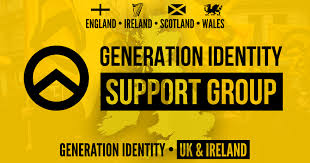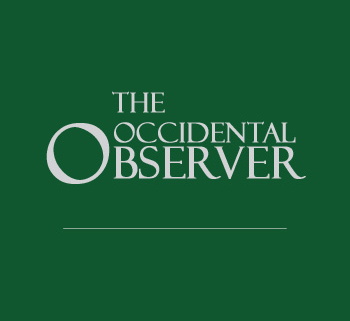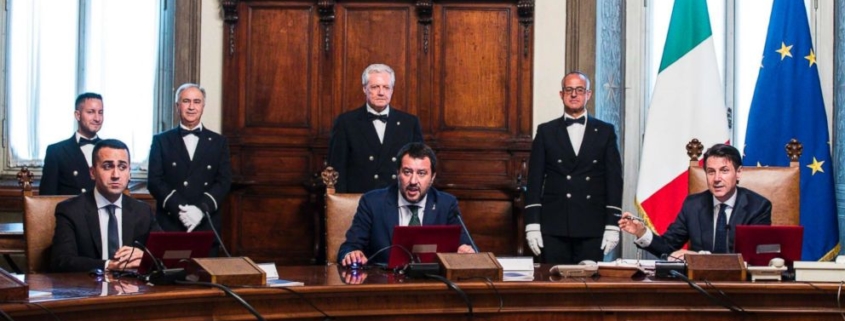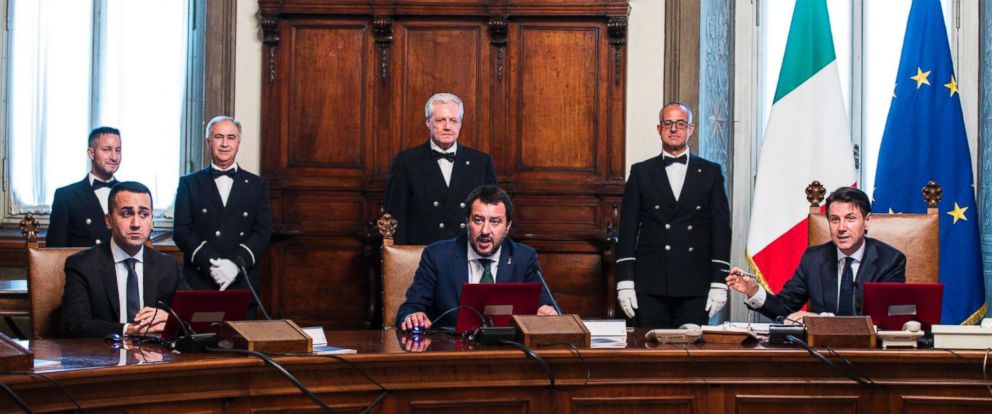Ethnofuturism? A Review of “Rebirth of Europe”
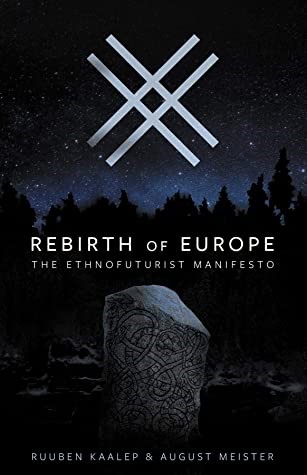
Ruuben Kaalep and August Meister
Rebirth of Europe: The Ethnofuturist Manifesto
Arktos, 2020
There are many ways I could describe the times we currently live in, and none of them are remotely optimistic. I therefore regard it as no small achievement that Ruuben Kaalep and August Meister, two young ethnonationalists from the Baltic states, have managed to craft an overwhelmingly positive, and even celebratory, manifesto out of the stinking refuse and imbecilic infatuations of the present age. H.L. Mencken once suggested that “all government, in its essence, is a conspiracy against the superior man.” Modern government in the West is a conspiracy against the White man alone, and the question of how to overturn this conspiracy is the single greatest challenge of our time. It has resulted in a proliferation of manifestos and ways of describing our politics, all with the aim of turning the political tide and bringing the majority of Europeans, wherever they may live in the world, to their senses.
This proliferation of ideas and methods has, however, probably added to our woes rather than alleviated them. Today we have a confusion of self-descriptions which only seem to exacerbate factionalism. And we have developed a veritable stew of manifestos that contradict each other or suggest different points of emphasis. Underpinning much of what now passes for contemporary ethnonationalist philosophy, particularly in the Anglosphere, is a kind of apathetic paralysis, and an expectancy of something undefined but nevertheless earnestly yearned for. I believe that the thing we yearn for most is clarity and confidence. Clarity of where we stand. Clarity of what’s happening to us. Clarity of our options. And the confidence to see these options through. Kaalep and Meister succeed where others fail because Rebirth of Europe is a masterwork of confidence and clarity.
Ruuben Kaalep is an Estonian nationalist and self-described ethnofuturist. He is a founder of the youth movement Blue Awakening (Sinine Äratus) and of the Conservative People’s Party of Estonia (EKRE). He’s also been a member of the Parliament of Estonia since 2019, where he belongs to the Committee of Foreign Affairs and chairs the Freedom of Speech Group. Other than this, I don’t know much at all about him, which says more about my ignorance of the affairs of Eastern European nationalism than it does about the scope of his activity. Images of the man depict a cheerful young fellow exuding the air of an eccentric artist, a sensibility that is carried through into this book in the form of a quirky and irrepressible rhetorical confidence. Kaalep wrote Rebirth of Europe with August Meister, who appears to be a pseudonymous Baltic writer with expertise in history and politics, between 2015 and 2017. Both are clearly talented, cultured, and well-educated. Although we are now almost four years on from completion of the text, it hasn’t aged at all since it refrains from discussion of the minutiae of contemporary politics (there are only one or two fleeting references to Trump, for example) in favor of a much grander and broader vision of the global political scene.
Rebirth of Europe is a short but incredibly subtle text of one hundred pages, divided into three chapters. The first chapter, “The Struggle of Our Time,” is a succinct description of the fundamental causes and manifestations of European decline. The second chapter, “Ethnofuturism,” is an appeal for an ethnonationalist politics prepared to embrace technology and move forward in history. The third chapter, “The Geopolitical Aspects of Ethnofuturism,” offers a wide-ranging view of the future prospects for European ethnonationalism on the international stage.
The book opens in a grand philosophical style that, in its appeal to “the organic principle,” reminded me somewhat of the opening of Yockey’s Imperium. What the first chapter essentially enunciates is the spiritual and cultural-political state of a civilization in crisis. The European crisis, as we are only too aware, unfolds on multiple levels, with Europeans confronted by runaway technology, by renegade concepts of individualism, by mass migration, by calculated subversion, by internal treason and corruption, and by loss of connection with the past. The last of these is a foremost concern of Kaalep and Meister, with the proposed solution being an attempt to embrace the future while simultaneously integrating elements of the past, avoiding mere nostalgic lapses.
In a broad sense, this is an unoriginal idea, and I mean that by way of complimenting the authors rather than disparaging them. What I am stressing is that such a proposal should not be regarded as quackery, or even niche thinking emanating from the political fringe. One of the most impressive and profound exponents of such an approach is Keiji Nishitani (1900–1990), a Japanese student of Martin Heidegger and one of the foremost twentieth-century philosophers of religion[1], who embraced and deeply respected European philosophy while questioning what Western modernism and technology would ultimately mean for his own civilization. This questioning ultimately led Nishitani into fierce opposition to nihilistic trends in European/Western modernity (see, for example, his The Self-Overcoming of Nihilism), and his proposal of something that sounds remarkably similar to the Archeofuturism later advocated by the late Guillaume Faye and, indeed, by Kaalep and Meister in the volume presently under discussion. In a series of lectures delivered to the Shin Buddhist Association in Kyoto between 1971 and 1974, Nishitani elaborated on the meaning of the confrontation between Japanese culture and those elements of Western modernism that we would now describe simply as globalism.[2] Nishitani rejected extreme individualism, which regards the Self as both singular and self-standing—as opposed to singular yet integrated into a community and heritage. Combined with science and technology, and rampant materialism, the extreme individualist view of the Self would, Nishitani insisted, lead to the eventual breakdown of all meaningful interpersonal human relationships. Materialistic atheism, unable to place the individual in the wider context of the universe as a divine place and creative source, would lead to the wholesale atrophy of culture and the regression of humanity. Professor Robert Carter, a Nishitani scholar, points out that
[Nishitani’s] strategy is not to advocate a return to the past, for he is adamant that the past is forever frozen and out of reach. Nevertheless, as human beings we carry the past with us in so many ways, and it is our task to breathe new life and significance into tradition, as it is shaped and reshaped by science, technology, and the cultures of the West. He is an advocate of change, but of a change that does not forget to carry its past into the future as an ingredient in the “mix of meaning” that quality living always demands. The authentic person is one who lives in the present with one eye on the past and the other on the future, on hope and possibility. Nishitani believes that what is required of us in the modern and postmodern world is that we simultaneously destroy and rebuild our traditional way of life in the light of the changes brought about by the secular age in which we find ourselves. Yet we must not simply join the secularists who have abandoned religion and much of tradition. They live blindly, being buffeted by the trends and fads of the moment. Moreover, they have accepted an ever-present nihilism as the preferred and rational understanding of the truth of the human condition, and in doing so have lost all awareness of a sustaining metaphysical and spiritual background to our impoverished materialistic and nihilistic foreground.
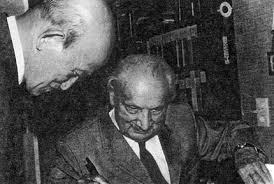
Nishitami with Heidegger
Nishitani, who today draws extreme caution from contemporary scholars due to his frequent use of the German for ‘Blood and Soil’ and his claim that only the European and East Asian civilizations can be regarded as globally pre-eminent,[3] elaborates a kind of ethnofuturism in poetic form, using the analogy of the kite:
It concretises what has just been said about the importance of tradition in moving forward into a new future, and encountering new circumstances, and yet remaining true to the past. … Like a kite, Japan has been able to steer a stable course, because of the ‘tail’ of tradition that has served to stabilise her flight into the winds of change, while being rooted or anchored by the ‘string’ of its deep culture. A kite without the weight of tradition and rootedness simply dances wildly, becoming entangled in tree branches, or is dashed to the ground, or breaks away altogether and loses its distinctive past. What here made Japan a country able to adapt to its own high-level modernisation are its deep-rooted traditions. The result has been a more balanced and stable form of progress [compared with that seen in the West]. When a strong wind blows, the power of tradition must be put to work. But … we cannot fly a kite if its tail is too heavy. It is of the utmost importance to strike a balance between these two inclinations; toward modernisation and change, and toward tradition.
The Struggle of Our Time
In Rebirth of Europe, Kaalep and Meister echo Nishitani’s sentiments almost exactly, and begin their text by advancing the argument that the European ‘kite’ has had its string and tail cut off, leaving it spiraling into chaos. This chaos is being cultivated by globalist elements who want to sever the ties of all nations to their histories and traditions and attempt to overwhelm the unique genetic heritages of different peoples by papering them over with a common totalitarian culture of conformity. Kaalep and Meister insist that “in the 21st century the fundamental conflict is between globalism and nationalism. … The struggle of our time does not so much manifest itself as a war with rows of poppies and cavalry charges, but as a cultural struggle. The world is either to become one, led by a totalitarian mass culture, or regrow into many—a diversity of unique ethnostates.” The pair claim that “the true ethnonationalist cares for all nations, and the principle of ethnonationalism seeks to provide every nation with a homeland. Therefore ours is a rebellion against the principles of liberalism, which see every country as belonging to everyone—and thus to no one. Nationalism seeks to save the world.”
Central to their manifesto is something Kaalep and Meister call “the Organic Principle,” which involves—once more echoing the East Asian philosophies of Nishitani and the Kyoto school of philosophy with which he was associated (though with Nietzschean and pre-modern European inflections), “a non-dual basic principle of existence—the highest possible unity, beyond good and evil, that integrates both spiritual and physical reality.” While some of this rhetoric is a bit head-in-the-clouds for my own taste, it is interspersed with enough clear language to enable to reader unfamiliar with some of the philosophy under discussion to take away the major message. In brief, Kaalep and Meister are arguing that
Ours is a world of constant battle between spiritual and physical forces, between identities, religions, cultures, between ‘us’ and ‘them.’ As life expands, it overcomes resistance, it becomes more complex and unequal, therefore conflict and struggle are counterparts of life itself. … This dialectic could very well be called the ‘circle of life.’ Life exists in movement, in differentiation, and inequality. … Universal inequality is a factor that allows the world to be dynamic and to evolve, giving everyone a chance to find his place in the organic whole. This is the non-discrimination principle of the organic state, and it is opposed to mechanistic humanism, according to which the individual is considered ‘a cog in the machine,’ replaceable according to the needs of some project of a superstate or the needs of the market.
Kaalep and Meister have an interesting section on hierarchy within historical European societies, reflecting on the fact that, while older caste systems are now much maligned, they were in fact transparent and socially satisfying. By contrast, our elites today thrive on the fact that,
The modern mechanistic hierarchies are secretive and based on a purely material ‘merit.’ … They are not accountable to anyone, but the influence of the upper levels towards the lower levels are totalitarian and without any sense of ethical responsibility. A vertical hierarchy of power is established; horizontal ties are made weaker by internal conflicts and an ideology of mutual hate, competition and individualism, which strengthens the power of the upper levels. The paradox today is this: in the conditions of the ideology of total ‘equality,’ a historically unprecedented amount of power belongs to those ‘above’ in relation to those ‘below.’ The historical uniqueness of this fact is related to the fact that today modern technologies and means of mass communication allow a maximum degree of manipulation of the cosmopolitan masses of men.
Kaalep and Meister, however, reject pessimism or despair, seeing in the acceleration of globalist liberalism merely the necessary hastening of civilizational collapse—a prerequisite of rebirth. For the authors, “the rebirth of civilization is an ever-present possibility that has to be comprehended and realised.” They insist that “the metaphysical core of our civilization and its integral tradition, which is profoundly ethnic, lies beneath, waiting for the right time to break through the artificial structures of postmodern civilization.” This rebirth will not be characterized by a wholesale rejection of modernity, but by subjugating its mechanistic elements to the organic principle: “the task of the future is to tame these awakened forces and to make them serve a higher purpose—the creation of a new culture and a new man with his roots still deep in the European soil and his eyes once again focused on the sky.” The book proceeds to a detailed examination of liberalism as a mechanistic ideology. We are told that “liberalism as a theory is inseparable from globalism as a power,” and that it is characterized by ‘permanent revolution’ against traditions, cultural norms and life itself. The text then moves to a thorough, and quite excellent, denunciation of conservatism, while incorporating and critiquing the ideas of Edmund Burke, Joseph de Maistre, and Nietzsche. The stress that mere conservatism is a losing strategy since its final demand of keeping things ‘as they are’ will always lead back to decadence and nihilism. The only true, natural path forward is to engage in a counter-revolution that synthesizes “the best elements of modernity and tradition.”
It goes without saying that Kaalep and Meister are very much pro-technology, which runs against the grain for those in our circles who tend more towards the kind of thinking laid out by Ted Kaczynski and Pentti Linkola, or the critiques of technological thinking that can be found in the writings of Martin Heidegger or Jacques Ellul. I count myself among those who could be described, at minimum, as being suspicious of technological progress, or at least doubtful of its prospects for unceasing progress given the eventual limitation of natural resources and the increasing environmental and social cost of technological expansion, particularly in the hands of a globalist elite intent on imposing a surveillance state and enforcing mass conformity. Even aside from certain ethical questions arising from, for example, the genetic editing of human beings, the mass contamination of our water supplies from toxic industrial chemicals, which has in turn led to decreasing fertility and mutations worldwide, should provide any reasonable person with enough reason to think carefully about the issues at hand.
That being said, geopolitical considerations demand that Europe/the West remain at least competitive in the technological sphere, meaning we are probably, for the foreseeable future, locked into the technological arms race. Since we cannot extricate ourselves from it, we may as well attempt to take the lead in it. In that case, the problem that presents itself is the potential impact on the nature of our civilization. Here, Kaalep and Meister suggest that we explore ways to “connect modern technology with the ancient way of being most inherent to man.” This certainly sounds like an ideal, but what does it look like in practical terms? Our authors don’t offer any answers, but I suppose the important thing is that they push the issue into the spotlight.
The book’s first chapter closes with a look at “New Left Totalitarianism and the Decline of the West.” None of the ‘meat’ in this chapter will be especially novel to readers of The Occidental Observer, but there are some memorable turns of phrase that encapsulate very well the situation we find ourselves in:
For this new totalitarianism, nations and peoples are considered obstacles that have to be removed and replaced with a new global order. … The most advantageous world for the global elite is one where the highest value is the individual, but the individual himself is freed with the help of postmodernism from any meaning, significance and wider context, and finds himself isolated and vulnerable.
After World War II, the Western populations were “fooled by the promises of economic prosperity and countless freedoms, rarely noticing that the freedom to remain who you are was not on the table.” Masterfully, our authors write
Governments and businesses have become gigantic and inhuman, but democracy in the essential questions just does not work. Indeed, where it is attempted, this sort of democracy only serves to alienate man further. The overall consequence is a universal sense of emptiness and stress for humans who have already lost any connection to nature and control over the technological process. Humans who now fill only the role of workers-employers are searching for their identities in the one-day fashion trends offered by consumer culture. This culture creates humans that are unable to react to each other as mature personalities. An illusion of constant ‘youthful revolution’ is created, while the youth just passively recreate models of behavior that are offered by the globalist elites; they, in turn, are part of the overall trends of the system.
Further,
We have even lost track of who we are, as no true identities can exist in a consumer society. On the surface, anyone can be special, free from all shackles of tradition; everyone can identify as whomever he likes. Thus, one is not born with any particular identity. If anyone can be a Frenchman, then no one is really a Frenchman. Where liberalism talks of diversity, it really aims at erasing all distinctions. Where it talks of multiculturalism, it aims are creating a global melting pot where no cultures survive.
In its last attack on the culture of Europe, liberalism is arranging the physical replacement of Europeans with people from other cultures. “It is mass immigration in catastrophic numbers.” But with this gambit, liberalism “is close to its grand finale.” Our authors insist that liberalism will consume itself in the process, and is “about to become an absurd notion, where even the values it itself has held begin to be reconstructed by its shape-shifter ideology.” At that moment, we will find “our chance to start a new European cultural cycle that shapes its history for many centuries to come. The liberals will be powerless to stop it. Then they will become conservatives, stubbornly refusing to accept the new reality that the nationalists will embark on.” This nationalism will have to be of a completely new type—Ethnofuturism.
Ethnofuturism
Ethnofuturism is a kind of nationalism that transcends national egoism. It does not seek merely to ‘conserve,’ because that entails a static defense while “life exists only in movement.” It has its roots, however, in the Conservative Revolution proposed in early twentieth-century Germany, and seeks to promote a rebirth of “the archetypes of Western civilization and forgotten forms of life that formed our civilization in the first place.” Disastrous immigration policies, which have become a unifying element for all European nationalists, mean that Europe as a whole will “be forced to return to traditional values and nationalism to survive.” America will be increasingly burdened by ethnic conflict, bringing to an end the “American Dream” of building a society in which ancestral heritage plays no role—“but this is inevitable, as a civilization that denies those fundamental truths will always be doomed to collapse.” Kaalep and Meister continue,
The fundamental basis for a new Europe must be ethnic nationalism. This means the importance of a nation as an organic whole has to be maintained. … In addition, the nature and landscapes of Europe have to be preserved, as those are vital to the cultural heritage and differences between people. The demographic survival of every nation has to be secured by governmental policies.
With Western Europe potentially catastrophically damaged by mass immigration and civil war, “this new Europe—and the new West—might have the centers of its culture in Budapest, Warsaw, and Tallinn. Mastering its demographic processes and not leaving them in the hands of liberalism, the new Europe will actually be able to economically and culturally compete with the rest of the world … After securing its ethnē, Europe’s fate in the 21st century will be decided by national eugenics, and presently only China seems to have an appropriate mindset.” Hungary is praised for its recent program of building a network of narrow-gauge railways that emphasize life in the countryside, and from which no multinational corporation has anything to gain. Our authors highlight this as “a sign of one of the most Ethnofuturistic tasks ever developed by a country in the 21st century. Modern technology and speed allow the combination of the advantages of the city and the countryside.”
Kaalep and Meister concur with my contention that we are more or less locked into a technological arms race. They point out that advancements in biotechnology and nano materials have “the potential to change economics and warfare by the end of this century beyond all recognition. … To fight against such technology would be self-defeating and even dangerous. The first government, corporation or group that masters biotechnology will inevitably have a huge advantage over all its rivals.” European nationalists must work together because, by the end of the century, “control over technology has to be in the hands of ethnonationalists, and not the globalists, supposing they have survived so long.”
From here, the text moves to elaborating upon reasons for rejecting any alliance with the Buckley-style economic conservativism dominant in the United States among Republicans, and for rejecting the New Right associated with Alain de Benoist that formed in 1960s’ France. The authors critique the latter for advancing “abstract ideas about organic communes and the rights of people to maintain their identity” because this “can lead to the approval of multiculturalism.” The New Right is also attacked for spending “much of its energy on fighting against Christianity,” thus alienating significant parts of its support base. The New Right is also criticized heavily for its support for the USSR and its strident anti-Americanism, and for neglecting to develop a clear political theory and corresponding practice. Kaalep and Meister reject the idea that we can focus our efforts on gaining cultural hegemony without bringing any practical results, producing only endless publications and conferences that contribute rich intellectual material without bringing about real changes in the lives of Europeans.
What Kaalep and Meister propose is a strategy that is both metapolitical and political, with radical and moderate wings. Of primary importance is the attack on, or infiltration of, anthropology, which has been in the “hands of liberals and Marxists” since the early twentieth century, and from which they marched through the institutions of the social sciences and the media. There are lengthy and very interesting statements of what should be demonstrated by activists and leaders, the most memorable of which are those relating to the need to cultivate the notion of a hierarchical and self-sacrificial elite: “The leader of the highest grade … must also be ready to be condemned for his activity and to take the risk of being slandered and accused by smaller men, because this is part of the price for his [spiritually] high lifestyle.”
Like some of the other writings contained in the book, this reminded me of Japanese parallels, notably some reminiscences relating to the Kyoto school founder Kitaro Nishida, who came under sustained attack from Marxists for his appeal to tradition, and steeled himself with the attitude of the samurai. Nishida once crafted a piece of calligraphy with the motto: “To risk everything, win or lose,” and a poem:
Let others do as they will,
I am who I am,
At any rate I will walk the way,
That I make my own.
Nishitani remarks that he once observed Nishida pick up a leftist magazine that contained an essay attacking Nishida and his philosophy. Nishitani recalls “I sat quietly nearby, watching with a mixture of curiosity and apprehension. Turning the pages, he came to the essay in question, read a little of it and threw it aside. His face showed no expression whatsoever.” This is surely the attitude called for by Kaalep and Meister.
The text then moves to fascinating proposals for the future State, the most important of which concern measures to raise birth rates and control the ethnic composition of the population. Following this, there is a substantial discussion of “Nationalism and Nature,” in which environmental protections are outlined.
The Geopolitical Aspects of Ethnofuturism
My favourite section of Rebirth of Europe is the final chapter, which offers a fascinating outline of informed speculation about our unfolding future. The section opens with the claim that
we are returning to the situation preceding the Industrial Revolution, in which economic strength will be determined by natural and demographical resources, because technological development will be basically the same for all of the nations of the world. This implies the inevitability of multipolarity and the return to superpower status for civilizations like China and India.
Kaalep and Meister see, in the end of American hegemony, an end to the Western mechanistic materialism it has come to symbolize. Similarly, they denounce the Eurasianist idea of Alexander Dugin because it “cannot function.” Russia is only capable to fighting Cultural Marxism in slogans, but not in practice. Russia “surpasses Western decadence, with impressive rates of abortions, alcoholism and drug addiction, which its political regime has not been able, or has not wanted, to stop. … Children of Russian politicians are living in the West, and the culture of Russia itself is overloaded with reality TV shows and vulgar mass culture.”
Kaalep and Meister add,
It will be neither Russia nor the US that will lead the future; rather we can expect a new Pacific era with China and India regaining their influence. These countries at least will not be liberal, pacifistic, or humanistic—they will use the scientific breakthroughs in service of their political greatness. Therefore, the European peoples will have to change their worldview in order to survive in this new competition, where are losing with each moment that we remain part of a liberal, self-hating and self-defeating system.
There is a very interesting section concerning the nationalist experience in the Baltic states, which is highlighted by a very strong sense of European brotherhood. When Kaalep and Meister claim the Baltic nationalists will do their utmost if called upon to defend Europe’s southern borders, or the demographic integrity of the Western European nations, one detects the deepest sincerity.
The book’s rather moving closing remarks concern duty and death, the conclusion of all spiritual journeys. “In the end, waging a struggle that seems already lost from the start is the only thing to do, precisely because nothing else matters. Nothing matters more than this.” Our authors finish by arguing that,
In the present situation of Western civilization, which appears to be going through an irreversible downfall, halting is not an option. This is more than just a matter of political ideologies; this is the inner logic of a culture. The only thing remaining to our nations is to survive this downfall. Most importantly, our genes and the traditions that carry our full potential have to survive. For the death and destruction of the West, brought about by liberalism, is ever approaching its singularity. When it reaches a certain point, this will be our opportunity. This will be the moment of a true returning to our roots, a returning without ever turning. When the Western world was celebrating diversity and multiculturalism, we foresaw its catastrophic destruction at its own hand. Moreover, when it begins to panic in the catastrophe that it was unable to avoid, then it will be our time to build a new European civilization. The circle will be complete.
Concluding Remarks
Rebirth of Europe is a refreshing and optimistic document that punches well above its weight for a book of such modest length. It has a depth, breadth, and clarity of philosophical understanding that is often rare in texts of this nature, and it is thought-provoking to say the least. The issues that it raises demand attention, and further action, by anyone concerned with the ethnonationalist cause.
Whether ethnofuturism is a reliable path in the longer term, however, remains to be seen. Other than China perhaps, do we really see any examples in the world today of a country that has managed to maintain significant elements of traditional culture while plunging headlong into technological development? For my part, I am sure that had Keiji Nishitani delivered his lectures today, some 50 years after he addressed the Shin Buddhist Association, he may have been more cautious in his advocacy for letting the national ‘kite’ take flight in the winds of change. The Japan of today may be superficially stable and technologically advanced, but has been plagued for decades by low fertility and high suicide rates, as well as the increasing marginalization of its traditions and religions.
Can the runaway train of industrial modernity ever be truly tamed enough to be marshalled by tradition? This remains to be seen. In addition to this problem, of course, is the question of those foreign elements embedded in the West who are dedicated to ensuring both that the ‘string and tail’ of the European ‘kite’ remain forever severed. How does a national movement reconnect a people with their history and traditions while harboring factions that want these same traditions and histories to disappear forever or to be permanently tarnished with shame? Perhaps the only comfort we can draw is, as Kaalep and Meister point out, the fact that even in catastrophe there may lie opportunity.
[1] See, for example, his monumental Religion and Nothingness.
[2] For the complete lectures, see K. Nishitani, On Buddhism (New York: State University of New York Press, 2006), 18.
[3] G. Parkes, “The Putative Fascism of the Kyoto School and the Political Correctness of the Modern Academy,” Philosophy East and West 47, no. 3 (1997): 305–36. For a more biographical exploration of anti-Marxism and Traditionalism within the Kyoto school see K. Nishitani, Nishida Kitaro: The Man and His Thought (Nagoya: Chisokudo Publications, 2016).

